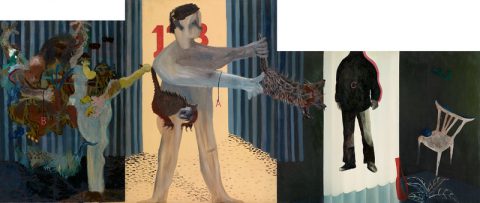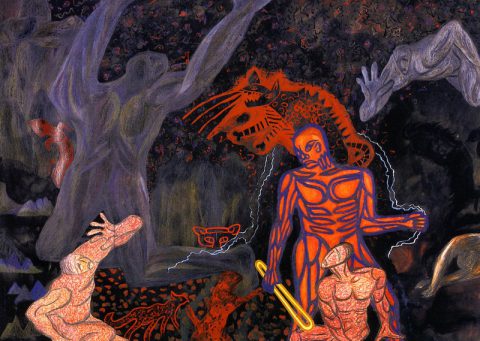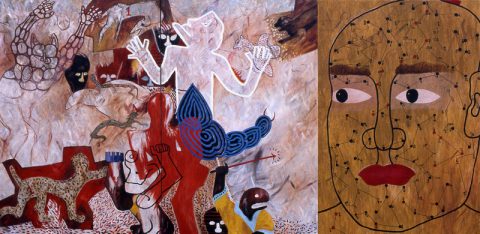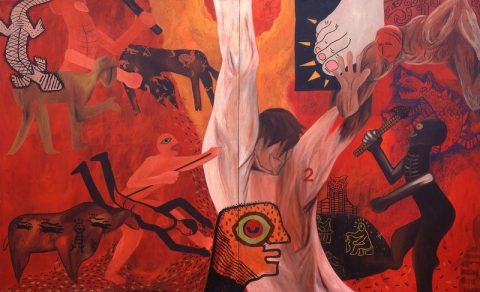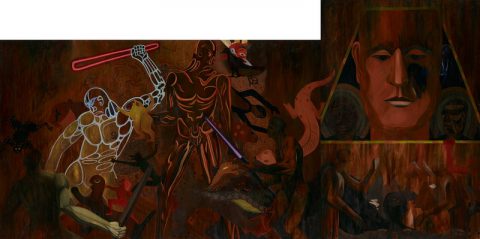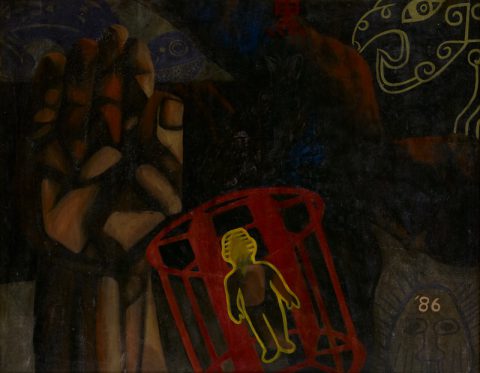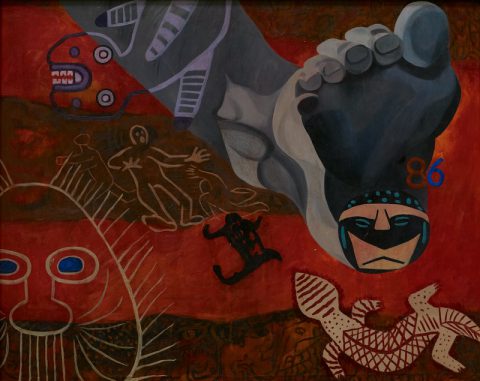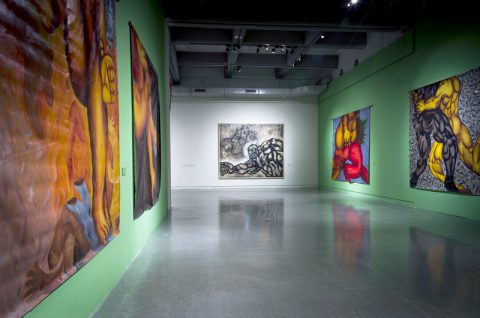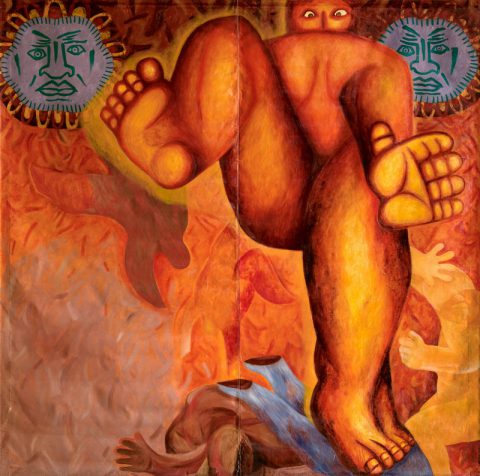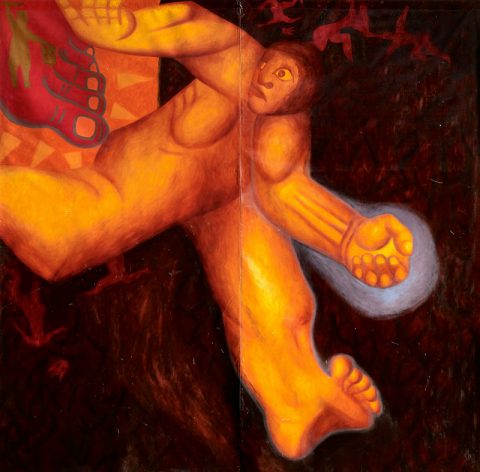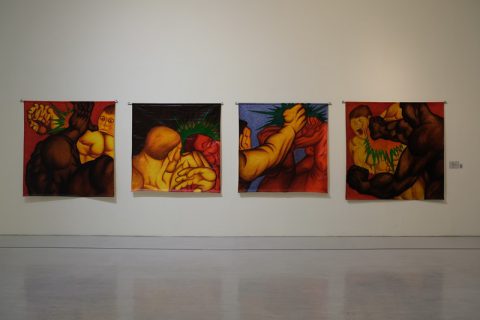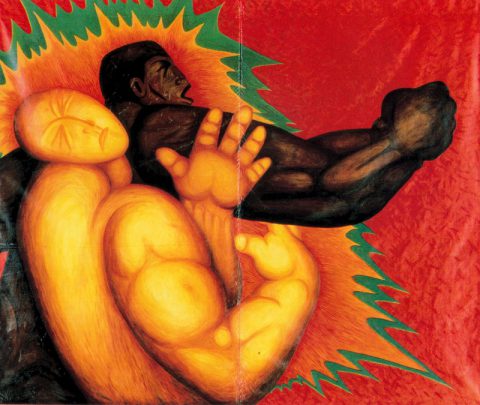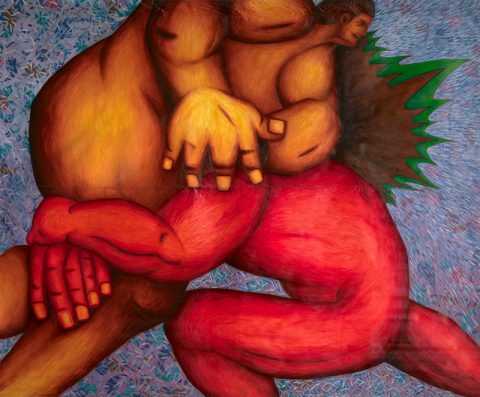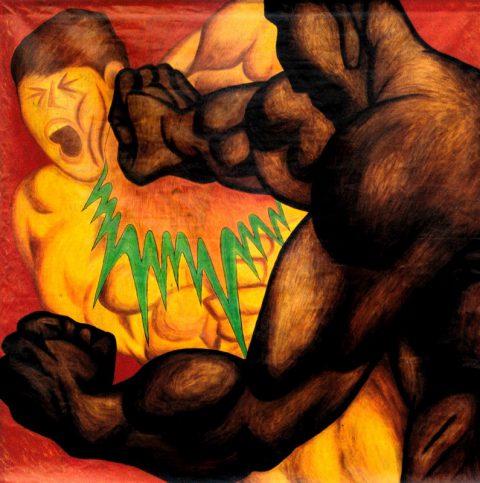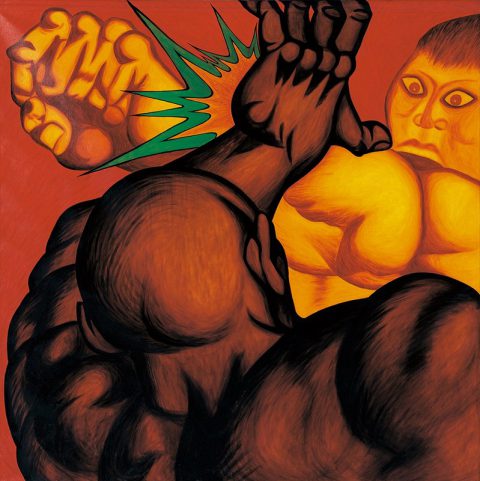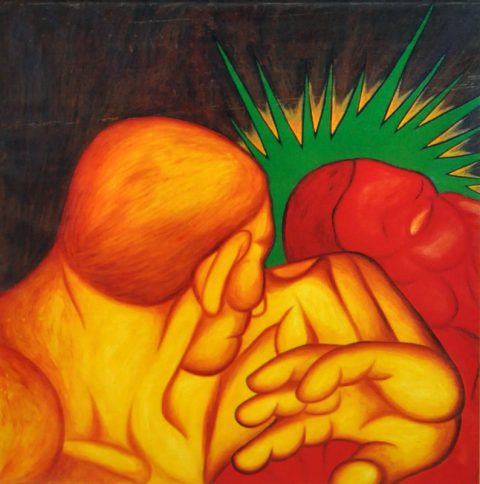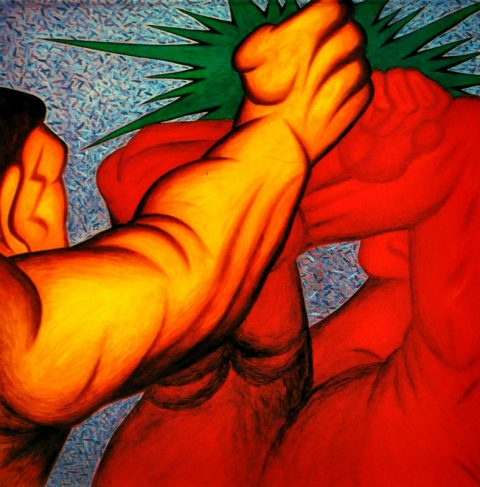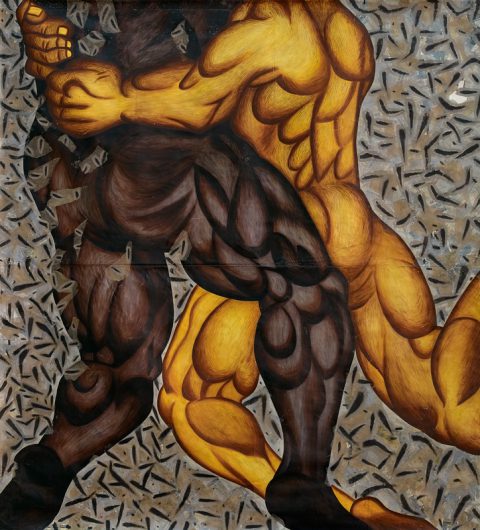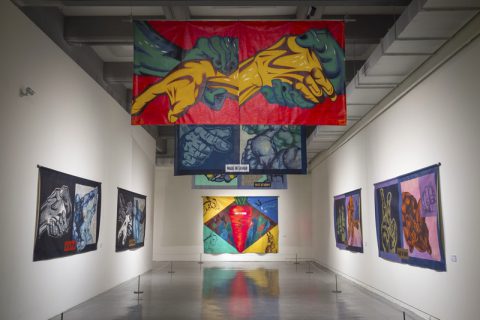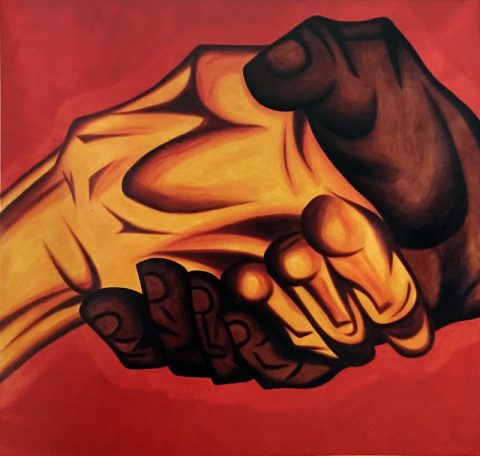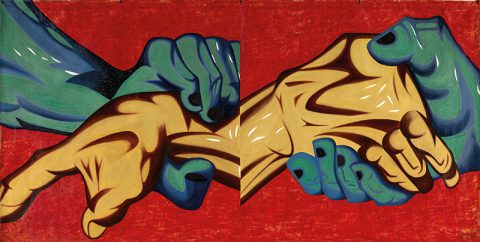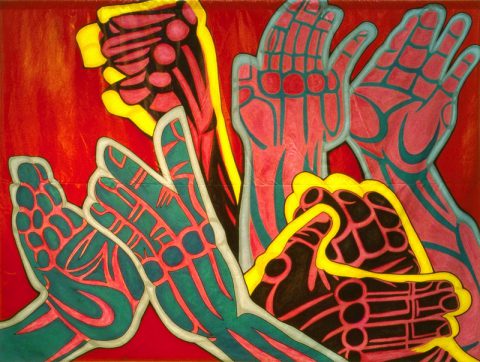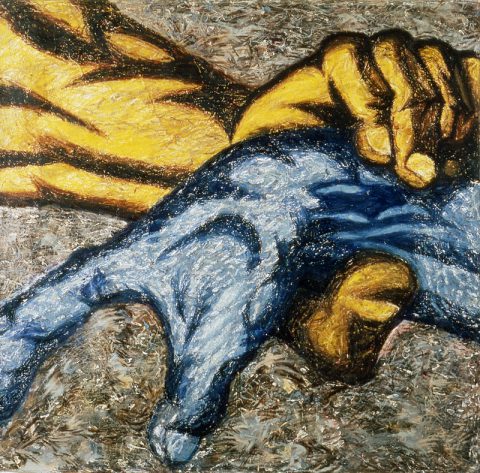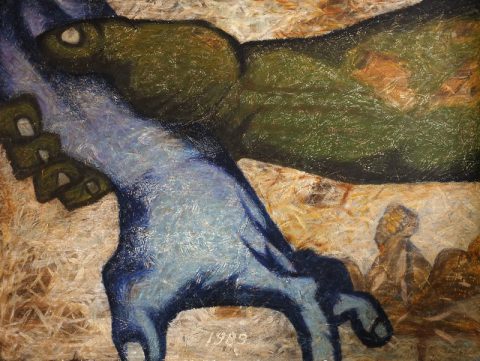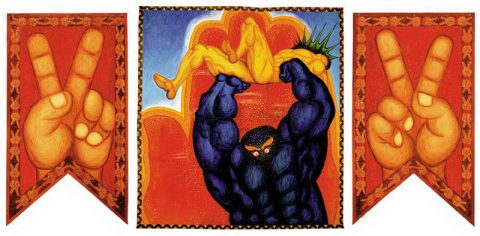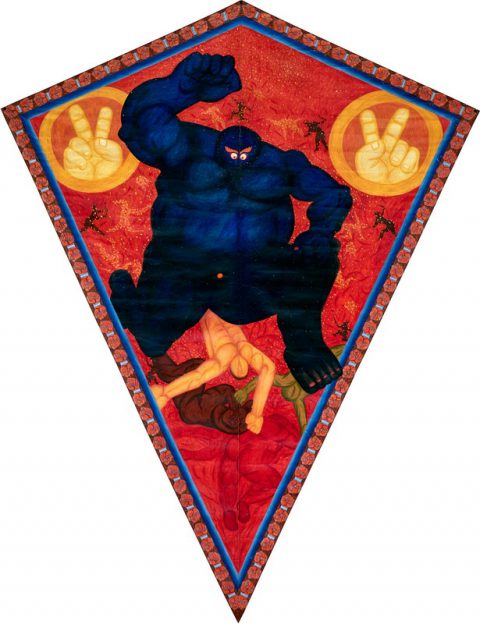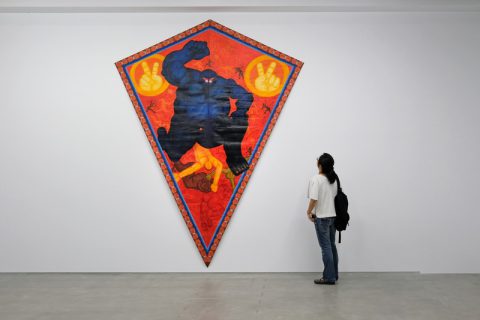1984-1989
在創作生涯的起點,楊茂林大膽揭櫫「本土圖像」的要旨,倡議「本土的、感性的、圖像的新繪畫」。這樣的態度顯然迴異於1970年代以來盛行的鄉土寫實,以及1960年代以來簡約、強調形式又脫離現實的抽象風格。楊茂林早期創作風格的轉換迅速而有效,1984年到1987年短短三年之間,他甩開冰冷的學院繪畫風格,成功塑造了反英雄、反體制的形象。他的創作思維回歸在地的文本,捕捉社會變動的脈動。1987年解嚴前後的年代,台灣政治、社會與文化之間的不諧調性異常突出,瞬息萬變、大量湧進的資訊,也與傳統價值、歷史記憶之間產生隔閡,在台灣文化領域上,產生了難以解決的矛盾情結。
1980、90年代的台灣正處在一個前所未有的內部變動期,楊茂林除將抗議與憤慨的情緒透過藝術的手段加以轉化,在接下來的創作階段,他更以「MADE IN TAIWAN」這項宏偉的創作計畫,企圖重新建構藝術與台灣政治、歷史與文化的關係。就「MADE IN TAIWAN」系列創作的整體,可以看出,楊茂林雖然身為藝術家,卻是以知識分子的角度,去關懷人的生存處境和文化的價值觀念。
Mythology Series.Graphic Hero.Behavior of Game Playing|1984-1989
At the beginning of his career, Yang Mao-Lin boldly announced his intention to use native imagery, proposing “a new kind of painting composed of local iconography and perceptions.” But what he had in mind was clearly different from the Native Realism popular since the 1970s, and also different from the abstraction of the 1960s that forwent realism for an emphasis on simplified forms. Yang’s early style quickly and effectively evolved during the three short years between 1984 and 1987, when he freed himself from dispassionate academic painting to create his anti-hero, anti-establishment images. It was then that his creative thinking returned to the local context and he seized upon changes occurring in society. Abrupt disharmony was seen in the politics, society, and culture of Taiwan during the transition away from martial law around 1987, and among the many changes was a sudden inflow of information from abroad. Many of these foreign ideas were at odds with traditional values and historical memory, thus producing difficult to resolve conflicts in the cultural field.
In his sweeping series MADE IN TAIWAN, Yang endeavored to reconnect art with Taiwanese politics, history and culture. His context was Taiwan’s unprecedented changes of the 1980s and 90s, and he employed the strategies of protest, call for justice, and artistic transformation. Throughout the series, Yang is not only an artist, but also an intellectual who is concerned with the plight of human existence and cultural values.
▼
有人在虐待動物I|油彩、畫布|130x307cm|1984
Someone is Abusing Animals I|oil on canvas|130x307cm|1984
激怒的共工|彩色鉛筆、水彩、壓克力顏料、紙|57x77cm|1985
The Fury of Kung-Kung|colored pencil, water color, acrylic on canvas|57x77cm|1985
蚩尤的命與運|油彩、畫布|194x130cmx3|1985
Chy You’s Fate|oil on canvas|194x130cmx3|1985
鯀被殺的現場II|油彩、畫布|162x260cm|1986
The Scene of the Killed Kun II|oil on canvas|162x260cm|1986
后羿射日之後|油彩、畫布|192x390cm|1986
After Hor-yi Shooting the Sun|oil on canvas|192x390cm|1986
禹的誕生|油彩、畫布|73x91cm|1986
The Birth of Da Yu|oil on canvas|73x91cm|1986
鯀|油彩、畫布|73x91cm|1986
Kun|oil on canvas|73x91cm|1986
圖像人物I|油彩、畫布|160x129cm|1986
Iconic Figure I|oil on canvas|160x129cm|1986
圖像人物II|油彩、畫布|162x112cm|1986
Iconic Figure II|oil on canvas|162x112cm|1986
圖像英雄I|油彩、畫布|250x250cm|1986
Graphic Hero I|oil on canvas|250x250cm|1986
圖像英雄II|油彩、畫布|250x250cm|1986
Graphic Hero II|oil on canvas|250x250cm|1986
遊戲行為.爭鬥篇I|油彩、畫布|254x303cm|1987
Behavior of Game Playing.Fighting Section I|oil on canvas|254x303cm|1987
遊戲行為.爭鬥篇II|油彩、畫布|270x330cm|1987
Behavior of Game Playing.Fighting Section II|oil on canvas|270x330cm|1987
遊戲行為.爭鬥篇III|油彩、畫布|170x171cm|1987
Behavior of Game Playing.Fighting Section III|oil on canvas|170x171cm|1987
遊戲行為.爭鬥篇IV|油彩、畫布|169.2x162cm|1987
Behavior of Game Playing.Fighting Section IV|oil on canvas|169.2x162cm|1987
遊戲行為.爭鬥篇V|油彩、畫布|157x156cm|1987
Behavior of Game Playing.Fighting Section V|oil on canvas|157x156cm|1987
遊戲行為.爭鬥篇VII|油彩、畫布|157x156cm|1987
Behavior of Game Playing.Fighting Section VII|oil on canvas|157x156cm|1987
遊戲行為.爭鬥篇VIII|油彩、畫布|265x240cm|1987
Behavior of Game Playing.Fighting Section VIII|oil on canvas|265x240cm|1987
遊戲行為.握與手I|油彩、畫布|162x158cm|1987
Behavior of Game Playing.Clench and Hand I|oil on canvas|162x158cm|1987
遊戲行為.握與手II|油彩、畫布|165x330cm|1987
Behavior of Game Playing.Clench and Hand II|oil on canvas|165x330cm|1987
遊戲行為.握與手|油彩、畫布|165x330cm|1987
Behavior of Game Playing.Clench and Hand|oil on canvas|165x330cm|1987
遊戲行為.握與手III|油彩、紙、畫布|175x175cm”|1989
Behavior of Game Playing.Clench and Hand III|oil, paper on canvas|175x175cm”|1989
遊戲行為.握與手IV|油彩、紙、畫布|112X145cm|1989
Behavior of Game Playing.Clench and Hand IV|oil, paper on canvas|112X145cm|1989
遊戲行為.勝與力I|油彩、畫布|260x240cm;138×78.5cmx2|1988
Behavior of Game Playing.Triumph and Strength I|oil on canvas|260x240cm;138×78.5cmx2|1988
遊戲行為.勝與力II|油彩、畫布|330x260cm|1988
Behavior of Game Playing.Triumph and Strength II|oil on canvas|330x260cm|1988

